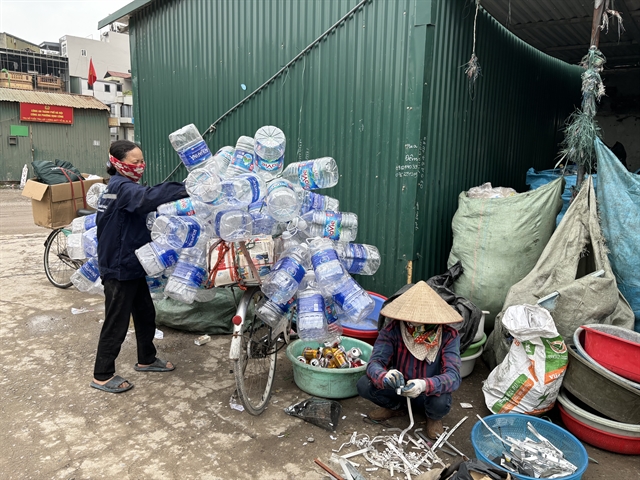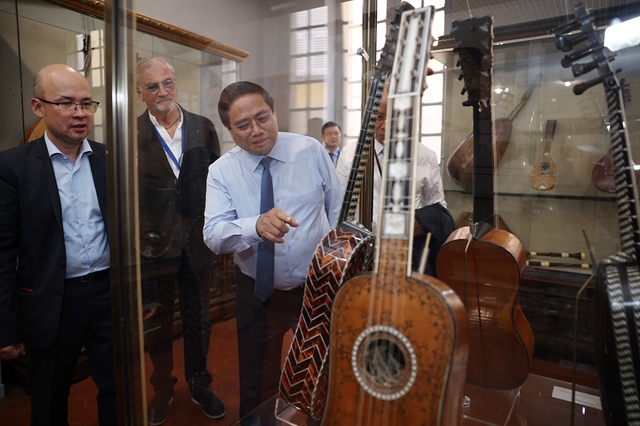 Society
Society

 |
| Self-employed scrap collector Vũ Thị Mai loads waste plastic bottles on her bike to sell to a scarp dealer on Định Công Street in Hà Nội. VNS Photos Khánh Dương |
By Khánh Dương
The image of individual scrap collectors, balancing bulky loads of discarded materials on their bicycles and navigating narrow alleys across Hà Nội, has become a familiar sight.
Commonly referred to by names like ve chai (glass bottles) or đồng nát (scrap metal) collectors, these self-employed workers play a crucial, yet often invisible, role in Việt Nam’s waste management system.
Sorting through garbage by hand, they collect plastic, styrofoam, paper, metals and other recyclable materials to sell to scrap dealers.
The United Nations Development Programme estimates that roughly 30 per cent of the waste in Việt Nam is collected by individual scrap pickers, about 90 per cent of whom are women.
Nguyễn Thái Huyền, deputy director of the Institute of International Training and Cooperation at Hà Nội Architectural University, said self-employed scrap collectors were still largely invisible in Việt Nam’s labour map.
According to Huyền, who has conducted studies on scrap pickers in recent years, despite this, they are estimated to collect over 3,000 tonnes of discarded materials per day, much of them brought in from outside Hà Nội and processed in the city's neighbourhoods.
Although their silent work is essential to Việt Nam’s circular economy and the push to sort garbage at source, individual scrap collectors often face deep societal stigma.
“People usually ignore them. Many scrap pickers hide in plain sight, doing their routine work quietly,” Huyền said. “They often internalise a sense of inferiority, as society views their work as menial, and something only done out of desperation,” Huyền said.
Scrap collector Nguyễn Thị Liễu, 65, would be enjoying retirement now if she had worked in the formal working sector. Instead, her day begins at 7am, cycling around the streets to collect scrap.
“On days with heavy loads, I don’t return home until 9pm. Working 10 to 12 hours a day is normal,” she told Việt Nam News. “It’s exhausting. The biggest challenge is the lack of proper protective gear, and worn-out bikes.”
Her income is unstable and depends heavily on market price fluctuations.
“Last week, I sold plastic waste at VNĐ100,000 per kilogram. But today it’s down to VNĐ70,000.”
 |
| Nguyễn Thị Liễu, 65, piles up bundles of discarded cardboard to sell to companies for recycling. |
Another collector, Vũ Thị Mai, said: “People discard everything together. In one bag, we have to separate plastic, styrofoam and even rotten fish and vegetables.”
She often picks up what could be sold and brings leftover food home to feed pigs or poultry.
Her day begins at 5am, washing dishes at a restaurant before starting her collection route around 6 or 7am.
“Sometimes we have to wait until midnight when restaurants throw out their garbage. Whether it’s raining, scorching or freezing, we still work unless we’re too sick to move.”
Most self-employed scrap collectors earn about VNĐ5–6 million a month, but spend nearly half on house rent and basic living costs.
In response to these hardships, recycling company VietCycle is stepping in.
“We’ve created the Xanh Nét Circular Ecosystem to connect individual scrap collectors and honour them as 'Green Warriors',” VietCycle director Nguyễn Văn Tuấn said.
VietCycle provides them with protective gear, means of transport, essential supplies, housing assistance and social insurance. The company has also offered training sessions on waste sorting and occupational safety to help the collectors improve working conditions and skills.
“These may seem like small gestures, but they are deeply meaningful,” Tuấn said. “This labour force has long been overlooked and subjected to discrimination. Yet they serve as the first filter in the plastic waste cycle, giving recyclables a second life.”
"Their work reduces the burden on the State by lowering the costs of waste collection, landfill maintenance and incineration," he added.
VietCycle’s training sessions also encourage scrap collectors to become 'environmental ambassadors', guiding residents in adopting household waste-sorting habits, a critical step towards a more sustainable future.
Individual collectors like Mai and Liễu are among those who will receive new bicycles from VietCycle to support their daily work.
“We’re really excited to get new bikes. Our work will become less burdened,” Mai said. “I hope the Government can offer incentives so that scrap dealers and recycling companies will buy our scrap at higher prices.”
 |
| A collector classifies metal scrap. VNS Photo Khánh Dương |
Mai said that better waste classification at home would ease their workload significantly.
Under Việt Nam’s revised Environmental Protection Law, which took effect at the start of 2025, households must sort domestic waste into three categories: recyclables, food waste and other waste. Fines for non-compliance range from VNĐ500,000 to VNĐ1 million.
However, regulation enforcement has been weak and public awareness remains low.
According to Quách Thị Xuân, country director of Pacific Environment Vietnam and coordinator from the Việt Nam Zero Waste Alliance, individual collectors know exactly what types of bins exist, and what cannot be sold to scrap shops. They can also access small alleys where garbage trucks can’t reach.
“They’re communicators for waste segregation,” she told Việt Nam News.
She also highlighted the lack of proper tools as a barrier.
“If roads had trash bins with separate compartments for each waste type, collectors wouldn’t have to go door to door any more.”
Xuân urged the Government and businesses to invest in better waste collection points and facilities to reduce the distances informal workers must travel.
“The authorities should also stabilise waste prices to ensure consistent incomes for these manual workers,” she said.
Back on the street, Liễu expressed a simple but powerful hope: “What I really wish for is a stable job – one that’s part of the formal sector.” VNS









